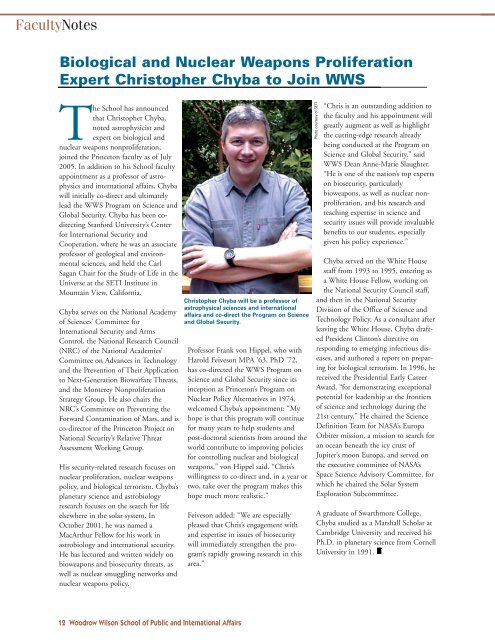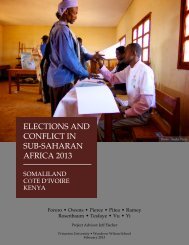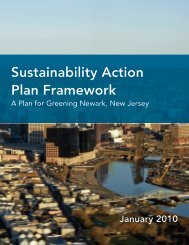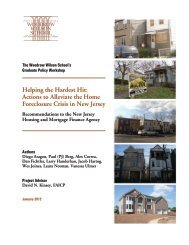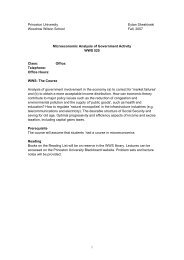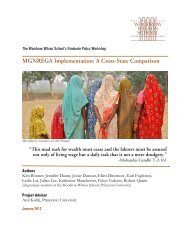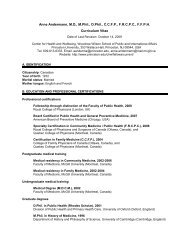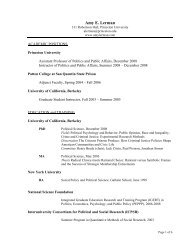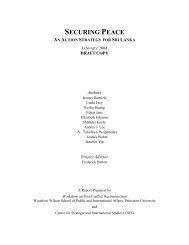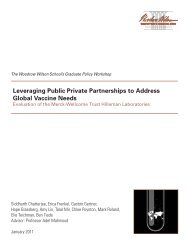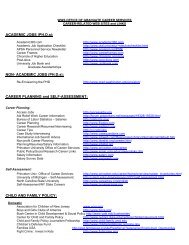Ambassador Ruth Davis: Foreign Service Should Look Like America ...
Ambassador Ruth Davis: Foreign Service Should Look Like America ...
Ambassador Ruth Davis: Foreign Service Should Look Like America ...
You also want an ePaper? Increase the reach of your titles
YUMPU automatically turns print PDFs into web optimized ePapers that Google loves.
FacultyNotes<br />
Biological and Nuclear Weapons Proliferation<br />
Expert Christopher Chyba to Join WWS<br />
The School has announced<br />
that Christopher Chyba,<br />
noted astrophysicist and<br />
expert on biological and<br />
nuclear weapons nonproliferation,<br />
joined the Princeton faculty as of July<br />
2005. In addition to his School faculty<br />
appointment as a professor of astrophysics<br />
and international affairs, Chyba<br />
will initially co-direct and ultimately<br />
lead the WWS Program on Science and<br />
Global Security. Chyba has been codirecting<br />
Stanford University’s Center<br />
for International Security and<br />
Cooperation, where he was an associate<br />
professor of geological and environmental<br />
sciences, and held the Carl<br />
Sagan Chair for the Study of Life in the<br />
Universe at the SETI Institute in<br />
Mountain View, California.<br />
Chyba serves on the National Academy<br />
of Sciences’ Committee for<br />
International Security and Arms<br />
Control, the National Research Council<br />
(NRC) of the National Academies’<br />
Committee on Advances in Technology<br />
and the Prevention of Their Application<br />
to Next-Generation Biowarfare Threats,<br />
and the Monterey Nonproliferation<br />
Strategy Group. He also chairs the<br />
NRC’s Committee on Preventing the<br />
Forward Contamination of Mars, and is<br />
co-director of the Princeton Project on<br />
National Security’s Relative Threat<br />
Assessment Working Group.<br />
His security-related research focuses on<br />
nuclear proliferation, nuclear weapons<br />
policy, and biological terrorism. Chyba’s<br />
planetary science and astrobiology<br />
research focuses on the search for life<br />
elsewhere in the solar system. In<br />
October 2001, he was named a<br />
MacArthur Fellow for his work in<br />
astrobiology and international security.<br />
He has lectured and written widely on<br />
bioweapons and biosecurity threats, as<br />
well as nuclear smuggling networks and<br />
nuclear weapons policy.<br />
12 Woodrow Wilson School of Public and International Affairs<br />
Christopher Chyba will be a professor of<br />
astrophysical sciences and international<br />
affairs and co-direct the Program on Science<br />
and Global Security.<br />
Professor Frank von Hippel, who with<br />
Harold Feiveson MPA ’63, PhD ’72,<br />
has co-directed the WWS Program on<br />
Science and Global Security since its<br />
inception as Princeton’s Program on<br />
Nuclear Policy Alternatives in 1974,<br />
welcomed Chyba’s appointment: “My<br />
hope is that this program will continue<br />
for many years to help students and<br />
post-doctoral scientists from around the<br />
world contribute to improving policies<br />
for controlling nuclear and biological<br />
weapons,” von Hippel said. “Chris’s<br />
willingness to co-direct and, in a year or<br />
two, take over the program makes this<br />
hope much more realistic.”<br />
Feiveson added: “We are especially<br />
pleased that Chris’s engagement with<br />
and expertise in issues of biosecurity<br />
will immediately strengthen the program’s<br />
rapidly growing research in this<br />
area.”<br />
Photo courtesy of SETI<br />
“Chris is an outstanding addition to<br />
the faculty and his appointment will<br />
greatly augment as well as highlight<br />
the cutting-edge research already<br />
being conducted at the Program on<br />
Science and Global Security,” said<br />
WWS Dean Anne-Marie Slaughter.<br />
“He is one of the nation’s top experts<br />
on biosecurity, particularly<br />
bioweapons, as well as nuclear nonproliferation,<br />
and his research and<br />
teaching expertise in science and<br />
security issues will provide invaluable<br />
benefits to our students, especially<br />
given his policy experience.”<br />
Chyba served on the White House<br />
staff from 1993 to 1995, entering as<br />
a White House Fellow, working on<br />
the National Security Council staff,<br />
and then in the National Security<br />
Division of the Office of Science and<br />
Technology Policy. As a consultant after<br />
leaving the White House, Chyba drafted<br />
President Clinton’s directive on<br />
responding to emerging infectious diseases,<br />
and authored a report on preparing<br />
for biological terrorism. In 1996, he<br />
received the Presidential Early Career<br />
Award, “for demonstrating exceptional<br />
potential for leadership at the frontiers<br />
of science and technology during the<br />
21st century.” He chaired the Science<br />
Definition Team for NASA’s Europa<br />
Orbiter mission, a mission to search for<br />
an ocean beneath the icy crust of<br />
Jupiter’s moon Europa, and served on<br />
the executive committee of NASA’s<br />
Space Science Advisory Committee, for<br />
which he chaired the Solar System<br />
Exploration Subcommittee.<br />
A graduate of Swarthmore College,<br />
Chyba studied as a Marshall Scholar at<br />
Cambridge University and received his<br />
Ph.D. in planetary science from Cornell<br />
University in 1991.


